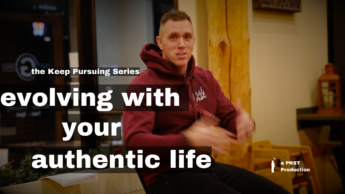This year we started a new New Year’s Day tradition…watching The Pursuit Of Happyness. I don’t remember how the idea came to me—I can’t remember if I saw it flipping through YouTube TV or if it just popped in my head, but I found it on Netflix and put it on as I made breakfast for everyone.
To my surprise, the boys were glued to the TV. We rarely finish watching a movie; after about 30-45 minutes the movie becomes background noise as the boys get into some type of physical activity. At 9, 7, and 2 they’re busybodies.
I know a movie cannot really make the boys appreciate the lives they’ve been born into, but it can begin the conversation. If you’ve seen The Pursuit Of Happyness, you know there are plenty of opportunities to discuss what some have and what others do not. A discussion is not enough–it’s just the start. The next step is to, as Tyrone Ross encourages us to do, get proximate—actually go to a children’s shelter or go serve food at a food kitchen and let them experience what they saw on TV in real life.
As parents, we want our children to have better lives than we’ve had. Money and good money habits do not guarantee happiness, but not having either can bring avoidable stress into an individual’s life. It should be a goal of ours to instill good money habits in our children, even if we don’t have the best habits ourselves.
Beyond The Basics
If you’re like most when you think about introducing money to your children you probably think about teaching your children how to balance a checkbook, save money, spend less than you make, or how to be charitable. These are all great lessons to teach—don’t forget a lesson on taxes; my favorite time to teach them about taxes is when they have some type of sweet I want. I take a bite or handful and explain to them that’s their tax and they need to get used to having a chunk of whatever they earn going to the IRS.
But, if you really want to instill good money habits in your children, go beyond these basics—don’t skip them, but don’t stop there either.
Appreciation
Going back to one of the original reasons I picked The Pursuit Of Happyness was to spark a conversation with the boys about appreciating the life they have. At their ages, they can’t really appreciate and understand how fortunate they are to have the blessings they have—a loving family, good health, a roof over their head, a safe community, good schools, and I could go on. They have very little to worry about relative to so many other children and it is important to me that they understand this, appreciate it, and be selfless enough to want to help others.
The willingness to help others only occurs when you appreciate what you have—then you are no longer concerned about getting more for yourself and you can focus on helping others.
I think back to my conversation with Ashby Daniels last year on All About Your Benjamins The Podcast; he shared how his family didn’t have a lot of money and often struggled, but his parents were always bringing food to other families. They certainly did not have a lot, but they appreciated what they did have enough to focus on helping others. Tyrone Ross has shared many stories like this with me and with Twitter and Periscope.
If you teach your kids to appreciate what they have, not only will they be more likely to help others, but they will also be less likely to try and keep up with the Joneses, or the Smiths, or the Whoevers–we all know this is one of the largest contributors to tough financial situations and it impacts families at all income levels.
Work Ethic
From the very beginning of the movie, Chris Gardner (Will Smith’s character) is grinding. His strong work ethic is exhibited numerous times throughout the movie. It starts with running around the city trying to sell scanners—he purchased some and is in the hole until he gets them sold. After dropping his son off at daycare, his day is spent chasing around doctors to share the scanner with them in hopes of making a sale.
Eventually, Chris lands an internship opportunity with Dean Webber and outworks everyone in his class, which ultimately earns him a position with the company that changes the trajectory of his life. Once again a tireless work ethic allowed Chris to build an extremely successful career as a stockbroker.
These are only two examples of the tireless work ethic that helped Chris Gardner to change his life—there are plenty of others in the movie, which you can identify and discuss with your children. Instilling a strong work ethic in your children will give them a leg up on the majority of their peers.
Most people are lazy.
It’s harsh but true. Most people are not willing to work hard and many others THINK they are working hard, but they really aren’t. Think about the individuals in your life that have a strong work ethic—it’s easy to do because they stand out. There are not many people like them, so it’s easy to identify the hard workers.
I also want to add not only was Chris Gardner a hard worker, but he paid attention to details, studied his craft, and built relationships.
Work ethic is hard to teach—it’s easier to lead by example. Show your children how to pay attention details, take on the little tasks most people avoid, put themselves in position where they will succeed/achieve by working harder than others, and have a conversation about how there are many variables in life that we cannot control—but we can control the effort we put forth and our work ethic.
Failure And Resiliency
Failure is unavoidable. No one is undefeated in life. A strong work ethic might help your children have a better chance of being in a position for success, but it will not prevent them from being passed over for a job, losing a loved one, becoming ill, or any number of setbacks/failures we experience throughout life.
Allowing our children to fail is one of the hardest parts of being a parent—our parental instinct is to protect our children from harm, disappointment, and sadness. We want them to be happy (and safe).
With failure comes two options:
1.) Get knocked down and stay down.
2.) Be resilient and get back up.
There are plenty of examples in the movie where Chris Gardner fails—not selling enough of his scanners, having his scanner stolen, his marriage falling apart, and the parking tickets that led to his arrest. There were PLENTY of opportunities for him to give up, but he always kept moving forward.
My hope is when the boys fail, after a brief moment of disappointment, they pick themselves up, learn from the experience, and move forward—wherever forward may be.
Relationships
In our professional lives, we’re told early to network, especially as financial advisors. Before you can be good at networking, you have to be good at relationships, which is something totally different.
Networking is just shaking hands, collecting business cards, and hopefully finding someone to do business with or that can send business to you—it’s no impossible, but rarely does this lead to any meaningful relationships.
Building a network is slightly different, but much more impactful.
Building a network is forming relationships, not just connections, that end up leading to friendships, partnerships, referrals, and so much more. The key to being good at relationships is to be selfless—think of others first. How can you help them? What are they going through? There are so many people only thinking of themselves and when someone sees that you’ve genuinely taken an interest in THEM—well, that’s where the magic occurs.
Being personable and likable is important as well.
In the movie, Chris Gardner is very charismatic, which helped him land his initial interview (the Rubix cube scene), win over management in that interview (covered in paint scene), and quickly find success as a stockbroker. It did not take long for anyone he met to like him—even the cab driver who hits him quickly shifts his anger to concern. Now, I’m not sure if charisma can be taught or if it’s one of those things you either have or you don’t, but I do know charisma alone doesn’t help you form meaningful relationships.
In addition to being charismatic, Gardner also follows up with people, does what he says he’s going to do, helps others out (sometimes to his personal demise), and is always in good spirits around others, despite whatever rough patch he’s currently battling. Charisma may be out of your control, but these traits are all within your control and can make up for not being the most charismatic.
Focus on helping others, doing what you’re going to say you do, and being genuine with the people you meet. It’s a simple formula, yet a struggle for many.
Entrepreneurship
Entrepreneurship can be a gift and a curse. Gardner spent his life savings on the bone density scanners and it didn’t turn out to be the great business decision it originally seemed to be—a curse. His entrepreneurial spirit is what also helped him land the internship which led to his job offer which led to the career that changed his and his family’s life—a gift.
The ability to create your own opportunities, whether that be an actual business or just new ideas, provides options.
The entrepreneur mindset is something I hope our boys inherit. I don’t care if they ever start a business; instead, I want them to see problems and rather than complain about them, try to find the solution to fix those problems. I want them to not be afraid to hustle and just find a way if life gets tough. I want them to think outside the box and to not shy away from risks. Finally, I want them to embrace failure and see it as a learning experience and not a reason to quit. These are all characteristics I identify with entrepreneurs.
Thankfully, entrepreneurship can be encouraged and taught through exposure. We can encourage our children to experiment with entrepreneurship through selling Girls Scout cookies, starting a mowing business, selling sporting cards, or any number of childhood interests that can be turned into a business.
Giving our children an entrepreneurial mindset is teaching them how to fish, not just giving them the fish.
Sidenote: The scene where it shows a young Gardner bringing home the scanners prompted Leo to ask me why he would do that and allowed me to explain how he bought it for one price and then would sell them for more—that’s how he would make money. I then was able to explain that’s exactly what his mom does with her store. We’ve talked about this before, but because the movie prompted his curiosity this lesson stuck with him. Who said watching movies was bad for kids.
Why These Values Are So Important
No matter how much money you have (or don’t have) these values and characteristics can be taught, or at the very least, encouraged. They are taught through conversations, through real-life experiences, and through spending time with them. Not only do these values and characteristics put our children in a better position to be financially stable, but they’ll also become better human beings—and THAT’S what it’s all about!
Kid Cudi: Pursuit Of Happiness
Disclaimer: Nothing on this blog should be considered advice, or recommendations. If you have questions pertaining to your individual situation you should consult your financial advisor. For all of the disclaimers, please see my disclaimer page.




3 thoughts on “Life Lessons From The Pursuit Of Happyness”
Comments are closed.